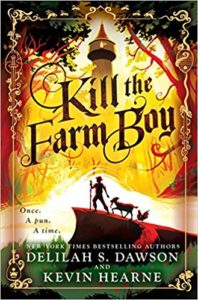 A sense of humor is mandatory for reading this book.
A sense of humor is mandatory for reading this book.
Kill the Farm Boy by Delilah S. Dawson and Kevin Hearne is delightfully absurd and laughs in the face of how one would usually expect a Chosen One fantasy story to go. Every last trope is engaged with in a way that flips it on its head and makes it hard for readers not to laugh out loud. (Unless you hate puns. Don’t hate puns when you read this book.) When Staph the Pixie tells the farm boy Worstly that he’s the Chosen One and also makes his goat talk, Worstly does what any Chosen One would do and finds a quest. But when his quest doesn’t go quite as planned, it’s up to a motley crew to try make things right and save both him and an entire enchanted castle worth of people.
In a way, Kill the Farm Boy is the other side of the coin from one of my favorite book series. However, David Eddings took every trope in the fantasy book and played in straight (yet still with humor) to show that one could still write an engaging story with so many familiar elements. Like Eddings’ Belgariad, Kill the Farm Boy cannot exist without all of these well known tropes being, well, tropes. This isn’t the first work of fiction to do this but what makes it special is the execution. It’s the sort of book that makes you narrow your eyes as you reach a part and go, “Are you about to…” and then leaves you in giggles as the authors seize the moment (and the joke) and run with it. In particular, there’s a scene with a troll that includes some modern nods that’s especially well done and something that only a book like this can pull off so satisfyingly.
Kill the Farm Boy is more than just hilarious though. Without characters like Fia, Gustave, Agrabella, Grinda and such, this would just be a string of comedy sketches. They all fill the traditional Dungeons and Dragons roles… or do they? Dawson and Hearne take the archetypes and make them very much their own. Gustave is an unexpectedly delightful talking goat and even the Dark Lord Toby has some charm to him despite his stated goal of killing the farm boy to try and get actual dark powers. The real highlight of the book as far as the characters are concerned is the budding friendship (and more) between Fia and Agrabella. Fia is a woman of color and the warrior and reluctant chainmail bikini wearer of the group and also a vegetarian. Meanwhile, the group’s bard is a cursed human-rabbit woman named Agrabella with some confidence issues. It’s sweet watching them get to know each other and being supportive as they go through their own struggles.
If you want to escape from the world for a few hours and just fill your heart with joy, laughter, and ridiculous puns, you can’t go wrong by picking up Kill the Farm Boy. If you love what Spaceballs did for Star Wars and science fiction, you’ll love what this book does for fantasy. Filled with both tropes and characters with hidden depth to them, it is an absurd read that will leave you feeling happy when you reach the end but also sad that there isn’t more (yet). Trust me: read this book. You won’t be disappointed.
Thank you to Random House for providing an advance copy of the book for review purposes.

